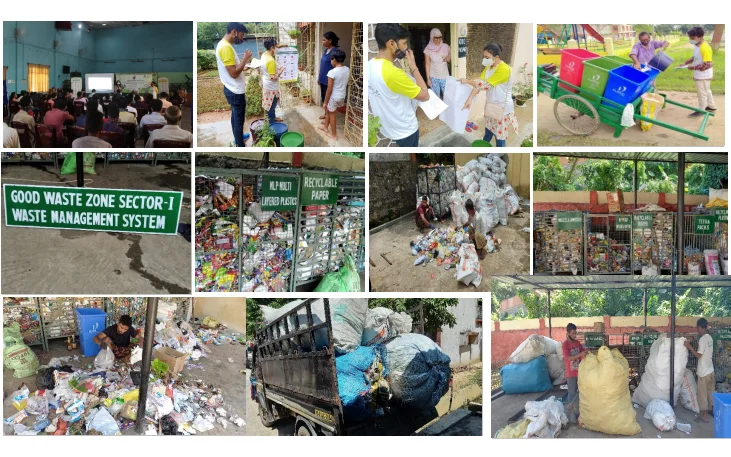
Nabajyoti Bora, IOCL
boranj@indianoil.in

GR made it Recycled
Recycling is the process of separating, collecting, and remanufacturing or converting used or waste products into new materials. But if we want to truly focus on recycling, it’s important to change the way we address it both on a personal and a societal level. Even as we live in a consumer-driven world, with a growing appetite for new things, if we begin to look at the waste created by this level of consumption in a different light, we might turn our problem into an opportunity. Whether it’s plastic, paper, or aluminium, the products and materials that can be used after they fulfil their original purpose are far from worthless. In fact, most materials have great recycling value. It is estimated that up to 75% of all the waste can be recycled or repurposed, a figure that how impactful the process can be if done right. Almost everything we see around us can be recycled, although different materials require different techniques when they are recycled. Most of the commonly recyclable materials include batteries, biodegradable waste, clothing, electronics, garments, glass, metals, paper, plastics, and a lot more. Recycling is much more than just reducing the amount of waste sent to the landfill, with a long list of benefits that aren’t limited to the environment. Recycling helps extend the life and usefulness of something that has already served its initial purpose by returning it to its raw materials and then using those materials to produce something that is usable. It’s part of the three golden rules of sustainability (Reduce, Reuse, and Recycle) and has a lot of benefits both to us humans and to the environment. Virtually all the planet is impacted by how much we recycle. However, in this story, we limit ourselves to the household-generated wastes only and their secondary treatments as an activity to environmental sustainability. Improving recycling behavior within the household can reduce environmental problems by significantly cutting down on waste being sent to the landfill, the key to successfully transitioning to comply with this new ordinance is residents participation in recycling programs, to change residents’ current recycling behavior and encourage more recycling in the household, it is necessary to have a thorough understanding of what motivates residents to recycle and segregate the household waste in its own, its our own responsibility not to harm our mother earth, a small contribution means a lot.
Types of household waste generated on a regular basis

How waste management was done at GR Townships, previously……..

How waste management was done at GR Townships, previously……..

Earlier the residents of Township used to keep the generated waste daily from household chores in one single bin in a mixed condition, which was very difficult to segregate. Then, the household-generated wastes were got collected by the housekeeping staff for further segregation of wet waste for making compost. Rest wastes were transported to Municipal Roadside bins and then for further
dumping at common landfills. Moreover, the waste used to get thrown in nearby open areas which was a health hazard for human beings as well as animals. No reuse & recycling of wastes.
Issues related to:
Recyclables were soiled due to mixed waste.
All the organic wastes were not recovered.
Reject wastes were causing unhygienic working conditions for housekeeping.
Not converted waste product into new materials.
Lost recycling value.
Contribution to landfills.
Damage to Mother Earth.
What was needed? Why is recycling of household waste necessary? And why it is important for the environment? What actions are required?
Recycling keeps trash out of landfill and prevents waste from pollution
Recycling reduces our need for new raw materials.
Recycling creates opportunities for the unemployed.
One person can make a big difference
Segregation at source is critical to its recycling and disposal. Lack of segregation, collection and transportation of un-segregated mixed waste to the landfills has an impact on the environment. When we segregate waste, it reduces the amount of waste that reaches landfills, thereby taking up less space. Not properly segregating the waste can additionally lead to difficulty for the rag pickers Since It reduces the chance of cuts and bruises of the garbage collectors or rag pickers. Separation of hazardous and non-hazardous waste is important as hazardous waste requires special handling. Pollution of air and water can be considerably reduced when hazardous waste is separated and treated separately. It is essential that waste is put in separate bins so that it can be appropriately dealt with. Waste poses a threat to public health and the environment if it is not stored, collected, and disposed of properly. It is high time we change the perception of ‘waste as an unwanted material with no intrinsic value’ to ‘waste as a useful resource’ with proper management
New actions taken for better standards and transformations thereafter
Guwahati Refinery, in association with an NGO, dedicated to the sustenance of a healthy mother earth “Earthful Foundation” took the initiative towards to implement an efficient waste management system in Guwahati Refinery Township. The following sequential activities were carried out by a dedicated team for 45 days continuously.

Orientation program
Door to Door Awareness and Dustbin Distribution
Monitoring the waste segregation
Physical segregation
Handing over to a recycler
Benefits obtained
Better Protection and no harm to the environment.
No contribution to dump yards/landfills
No addition of pollution to natural resources
Employment opportunities.
Better economic growth of society due to reuse. (Cheaper rates for recycled products)
Few items made from recycled waste
Furnace Oil by Pyrolysis Process from Single used plastics
Eco bricks from Tetra Packs (Taaza Milk Packets, Frooti Packet, Mustard Oil Packet etc.)
Add on to fuels in cement factories from multilayered plastics (e.g., Chips packets, Noodle packets etc.)
A cleaner society and a better place to live by humans and animals.
This way Guwahati Refinery Township (Sector-1) has achieved the status of a Zero Waste Zone as its Township.
Schematic flow of 3 types of Segregated Wastes

Future Roadmap
The project “GR made it Recycled” at Kendriya Vidyalaya Noonmati After successful completion of project “GR made it Recycled” at GR Townships (Sector-I) Guwahati Refinery in its way to implement the same at its own sponsored school Kendriya Vidyalaya Noonmati Guwahati keeping following objectives in mind with special emphasis on the following points:
To motivate students for Social Work for a better future.
To form network-based teams amongst students for waste management activities.
To organize various competitions amongst students to encourage them to take care of Mother Earth through waste management.
Students are also to be considered for practically witnessing activities like waste segregation, and the use of various types of waste including secondary processing of plastic items in various processing units in and around Guwahati.
To find a way out to motivate parents through their wards to reduce single-use plastic in daily life.
A roadmap to be developed for handing over of useable plastics to the recycler, generated at individual student’s place.
Summary
Seeing the earth sinking due to the generated wastes and deteriorating environment, made us to think differently and to contribute to making this world a better living place. Guwahati Refinery started this initiative of waste management to save our mother earth. The reason for publishing the story is to create awareness amongst the people and to pay attention to recycling of generated wastes on daily basis because such initiatives make a great contribution to the environment.
Posted in Health & Wellbeing | No Comments »
Recent Articles
- Navigating Leaves: Balancing Connectivity and Breaks in Today’s Workplace
- Boost Your Productivity with the Pomodoro Technique
- The Busy Professional’s Guide to Self Care
- Mental Health @ Work
- Mental Health and Well-being
- Positivity: Why you should make a New Year’s Resolution
- Get To Know About Nomophobia
- Delivering Happiness during Pandemic
- HUMRAHEE: We are in This Together
- CHETNA: Personal Connect during COVID 19
- Ecosystem Restoration @ BPCL
- Leading the Way: HR Initiatives during Pandemic
- Living with the Invisibile
- Resurrection
- Health and wellness- From benefits to necessity
- Personal Strategies to Improve Well-being-CALM ki baaten
- Sustainability as Competitive Advantage
- Cold Feet Before the Meeting! Does it Sound Familiar
- 9 Common Workout myths debunked
- Positive Psychology – Mantra of Well-being
- Human Resource Development Through Sports At Workplace
- Nature Heals_How to boost your brain power with nature
- Success Story of Waste Segregation
- Occupational Health & Safety Bulletin on : Managing MSDs (Musculoskeletal Disorder)
- Gratitude: The Game Changer Antidote to All The Dis-eases
- Effective Time Management
- Watch out and act now Prioritizing Mental Health at Work
- Pursuing a Passion Outside of Work for mental wellness
- Prioritizing Mental Health at Work
- Health or Help – what will you prioritize?
- Digital Wellbeing – Way towards Mental Health
- Love yourself the way you want others to
- Kissa Kursi Ka
- Atychiphobia: Understanding the fear of failure
- Is Yoga = Meditation? Let’s solve it
- Overcoming Failure
- From Surviving to Thriving: Building a Culture of Employee Well-being
- Solid Waste Management -A dire necessity
- Sleep health: The cornerstone of Wellbeing
- Miracle of Stress
- Health & Wellbeing in the Organization
